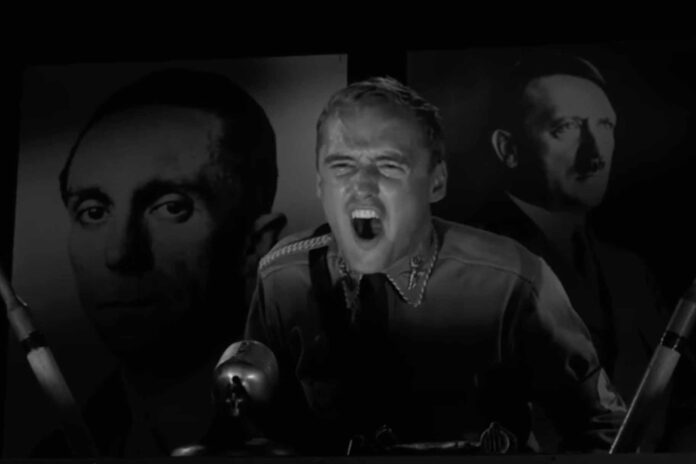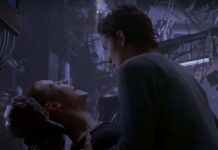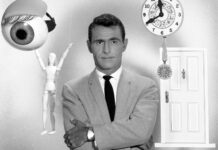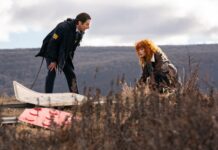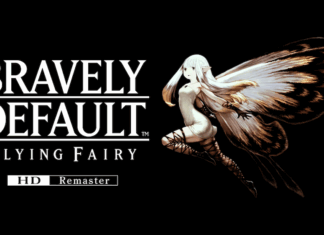[ad_1]
On June 24, 1983, audiences returned to that eerie dimension of sight, sound, and mind with the release of Twilight Zone: The Movie.
A feature-length collection of different segments overseen by the likes of John Landis, Steven Spielberg, Joe Dante, and George Miller, the film mostly comprised remakes of classic episodes of The Twilight Zone (which air regularly on SYFY), strung together with narration from one of the show’s legendary guest stars, Burgess Meredith. While the film did quadruple its $10 million budget in ticket sales, it was neither a critical nor cultural success. Much of the lackluster reception had to do with the infamously tragic events on the set of the Landis-directed bit, “Time Out,” which resulted in the unnecessary deaths of three people — two of them children.
While it took the involvement and industry clout of Spielberg (a Hollywood juggernaut by the early ’80s after Jaws, Close Encounters of the Third Kind, E.T., and Raiders of the Lost Ark) to get the project made in the first place, the idea of a feature-length adaptation of Rod Serling’s groundbreaking anthology series actually began over three decades earlier with the creator himself.
Rod Serling wanted to turn The Twilight Zone‘s “He’s Alive” episode into a movie
In a 1986 issue of The Twilight Zone Magazine, a piece entitled “All the Little Hitlers” (written by Hal Erickson) reveals that Serling had hoped to turn the hour-long Season 4 episode “He’s Alive” into a theatrical release. Airing on January 24, 1963, the episode helmed by Stuart Rosenberg (future director of Cool Hand Luke and The Amityville Horror) starred a young Dennis Hopper as a wannabe American Führer named Peter Vollmer, who begins to receive fascist, ill-fated guidance from the shadowy ghost of Adolf Hitler (Curt Conway).
The late dictator’s underhanded tips and tricks to gain the support of a crowd with xenophobic, racist, and generally bigoted rhetoric help take Peter from a laughed-at joke to a growing danger; a danger clearly recognized by Vollmer’s surrogate father figure, a Jewish Holocaust survivor of the Dachau concentration camp named Ernst (Ludwig Donath).
Serling, who felt the script was one of the best he’d ever written for The Twilight Zone, was ultimately let down by the final edit, which omitted a crucial scene of Vollmer encountering a deluge of Nazi symbols after learning the true identity of his dictatorial benefactor once Hitler finally steps out of the shadows. This truncation was done by producer Herbert Hirschman to meet the pre-allotted network time slot, but Serling put forth a unique compromise: just release two versions.
The shortened edit, he proposed, would air on CBS, while a significantly longer draft of the script would be turned into a movie (per Erickson, the TZ mastermind had already been trying, unsuccessfully, to develop a movie based on the show since 1960). Serling even went so far as to write additional scenes, fleshing out the backstories of Peter’s sycophantic toadies and adding in the character of an FBI agent investigating the unnamed neo-Nazi group. In the end, however, Hirschman shot the idea down. Serling would remain disappointed with the episode for years after — not only with the rejection of his theatrical plan, but also with the central performance of Hopper.
“I thought it was one of the best-written scripts, completely pissed away by the performance of Dennis Hopper,” Serling admitted during a talk at UCLA in the spring of 1971 (about four years before his death). “I must tell you this in utter frankness, and I’ll say it to Mr. Hopper as well. It was a most uncontrolled, undisciplined performance, which took considerably more thespic talent than the young man had at the time. It needed a very restrained performance, and Dennis started to cry in Reel 1. There was, simply, emotionally, no place to go … It was a corker of a script. It was one of those scripts where, unlike usually where the critic says, ‘It was a lousy script, but Gary Cooper saved it,’ this, I think, [was] a very good script literally damaged badly by a performance.”
Classic episodes of The Twilight Zone air regularly on SYFY. Click here for complete scheduling info!
[ad_2]
Source link

